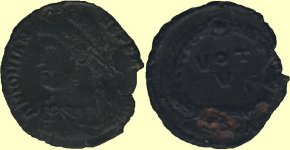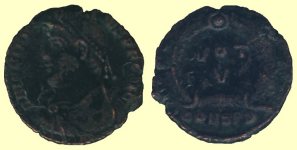
Jovian 363 - 364 A.D.
By clicking on the pictures you'll be linked to a more complete description of the coin. At the bottom of this page there is a more elaborate biography of the emperor.
 |
Obverse: DN IOVIANVS PF AVG |
| Reverse: VOT V | |
|
Fieldmarks: -
|
|
| Exergue: CONSPA |
 |
Obverse: DN IOVIANVS PF AVG |
| Reverse: VOT V | |
|
Fieldmarks: -
|
|
| Exergue: CONSPD |
Jovian 363 - 364 A.D.
Flavius Jovianus was born in 331 at Singidunum. He was the son of Varronianus the commander of imperial bodyguard (comes domesticorum) of Constantius II. Jovian was married and had two children one whose name is unknown the other was named Varronianus after his father. Jovian began his career as a protector domesticus in the same force as his father, serving first Constantius II, then Julian. By 363 AD, following his father's example, he rose to become commander of the guards. Jovian marched with Julian against the Persians and king Shapur II in 363. On the 27th of June, the day after Julian died, Jovian was acclaimed Augustus (immediately or after others refused the position this is not quite clear). When the news of this succession reached the Persian king Shapur II he was immediately encouraged to increase his attacks on the Roman forces in Mesopotamia. Jovian, hard pressed by these attacks and by pressures from possible usurpers at home, lost his nerve and quickly sued for peace. This peace came naturally at a high price, he had to agree to withdraw from the territories beyond the Tigris annexed by Diocletian, and leaving to the Persians the fortresses of Nisibis, Castra Maurorum and Singara. The only favorable turn here was that they where to be surrendered on the condition of the safe passage of their inhabitants. And finally the guarantee of the neutrality of Rome's ally Arsaces, King of Armenia, in the event of future hostilities between Rome and Persia, this treaty was to be for the duration of 30 years. After this shameful treaty Jovian moved to Tarsus where he performed the funeral rites for Julian. He then moved to Antioch where he staid for a couple of weeks to rest his weary troops. At Antioch he also condemns his predecessor Julian's pagan faith and restores the Christian church. After this Jovian quickly makes his way back to Constantinople to protect his throne. On the 1st of January 364 in Ancyra, capital of the province of Galatia, Jovian takes on the title of consul together with his son Varronianus. Then he moves to the small town of Dadastana on the border of Bithynia and Galatia where, on the early morning of the 17th of February 364, he is found death in his bed. The cause of his death varies depending on the source you use, they range from suggestions of poisonous fumes from the room's fresh plaster, fumes from the fire or severe indigestion after having eaten too much. Whatever the cause it appears by all accounts to have been a natural death and not a violent one. The body of Jovian was sent to Constantinople to be buried with his predecessors in the Church of the Holy Apostles after a reign of only 8 months.
For this biography I've used the texts from the following websites:
http://www.imperiumromanum.com/
http://www.roman-emperors.org/
http://www.roman-empire.net/
And from: Gibbon's Decline and fall of the Roman empire.